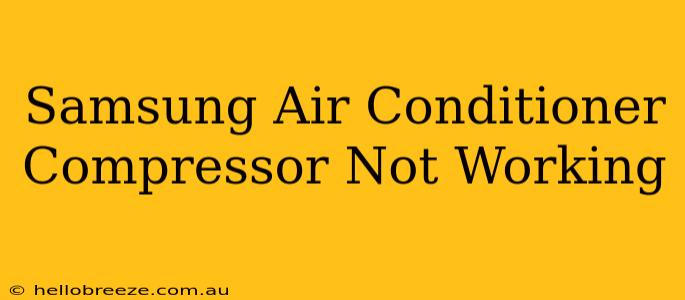Is your Samsung air conditioner refusing to cool? A non-functional compressor is a common culprit. This guide will walk you through troubleshooting why your Samsung AC compressor isn't working and offer potential solutions. We'll cover everything from simple checks to more advanced repairs, helping you determine whether you need a professional technician or can handle some fixes yourself.
Common Reasons Your Samsung AC Compressor Isn't Working
Several factors can prevent your Samsung AC compressor from starting. Let's explore some of the most frequent causes:
1. Power Supply Issues: The Most Overlooked Culprit
Before diving into complex repairs, check the basics:
- Circuit Breaker: Is the circuit breaker tripped? Locate your home's electrical panel and check the breaker that controls your AC unit. If it's tripped (switched to the "off" position), reset it by flipping the switch to the "on" position.
- Power Cord: Inspect the power cord for any visible damage like fraying, cuts, or loose connections. A damaged cord needs immediate replacement. Never attempt repairs on a damaged power cord yourself.
- Outlet: Make sure the outlet itself is functioning correctly. Try plugging another appliance into the same outlet to test it.
2. Capacitor Problems: A Frequent Failure Point
The capacitor in your air conditioner is crucial for starting the compressor. A faulty capacitor can prevent the compressor from engaging. Do not attempt to test or replace a capacitor unless you have experience working with high-voltage electrical components. This is a job for a qualified technician.
3. Overheating: A Safety Mechanism
If the compressor overheats, a safety mechanism may shut it down. This is a crucial protection feature, and ignoring it could damage your unit. Check for obstructions blocking airflow around the condenser unit (the outdoor part of your AC system). Clean any debris like leaves, grass, or dirt.
4. Refrigerant Leaks: A Sneaky Issue
Low refrigerant levels will stop the compressor from running. Refrigerant leaks require professional detection and repair. Do not attempt to recharge the refrigerant yourself. Improper handling can be dangerous.
5. Faulty Compressor Motor: The Worst-Case Scenario
If all other checks are fine, the compressor motor itself may be faulty. This often requires a professional's assessment and likely a compressor replacement. A humming sound from the unit without cooling is a major indication of this issue.
When to Call a Samsung AC Repair Technician
While some minor troubleshooting can be attempted at home, certain problems require professional expertise:
- Refrigerant Leaks: Identifying and repairing leaks requires specialized tools and knowledge.
- Compressor Failure: Replacing a compressor is a complex task best left to trained professionals.
- Electrical Problems: Working with high-voltage components is dangerous and should only be done by licensed technicians.
- Persistent Issues: If you've tried basic troubleshooting and the compressor still isn't working, it's best to call a qualified technician to avoid further damage.
Preventing Future Compressor Problems
Regular maintenance is key to extending the lifespan of your Samsung air conditioner compressor:
- Annual Inspections: Schedule professional inspections and cleaning at least once a year.
- Air Filter Changes: Regularly change or clean the air filter to ensure optimal airflow.
- Condenser Cleaning: Keep the outdoor condenser unit clean and free of debris.
By carefully following these steps and knowing when to seek professional help, you can effectively troubleshoot your Samsung air conditioner compressor issues and get your home cool again! Remember, safety should always be your top priority when dealing with electrical appliances.

